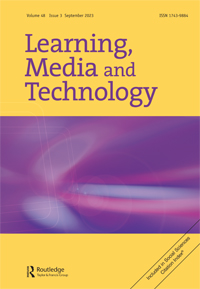学生在课程边界之外使用在线平台和资源的能力和代理
IF 3.1
1区 教育学
Q1 EDUCATION & EDUCATIONAL RESEARCH
引用次数: 1
摘要
摘要:本研究探讨了当大学生通过在线平台上的资源实现支持,跨越课程界限学习软件开发时,代理是如何表达的。本研究采用定性研究设计,对27名计算机和软件工程专业的学生进行了个体刺激回忆访谈。混合主题分析采用了一个生态框架,在这个框架中,学生在软件开发任务中执行的动作被用关系术语解释。结果显示,当学生通过使用不同在线平台上的各种资源学习时,实现了多个相互关联的启示。代理主要通过学生追求与他们跨平台和课程边界的学习相关的特定目标来表达,并在人和环境中共享和分布。研究结果强调了这样一种观点,即边界的形成和跨越是基于人们对环境的体验,而环境又受到所使用资源的推动或限制。本文章由计算机程序翻译,如有差异,请以英文原文为准。
Affordances and agency in students’ use of online platforms and resources beyond curricular boundaries
ABSTRACT This study explored how agency is expressed when undergraduate students cross curricular boundaries to learn software development by realising affordances enabled by resources on online platforms. The study employed a qualitative research design based on individual stimulated recall interviews with 27 computer and software engineering students. The hybrid thematic analysis employed an ecological framework in which the actions the students performed during software development tasks were interpreted in relational terms. The results reveal multiple interrelated affordances that were realised as the students learnt by using various resources on different online platforms. Agency was expressed primarily through students pursuing specific objectives related to their learning across platforms and curricular boundaries and was shared and distributed across people and the environment. The findings highlight the idea that boundaries are formed and crossed based on how people experience the environment, which, in turn, is enabled or constrained by the resources used.
求助全文
通过发布文献求助,成功后即可免费获取论文全文。
去求助
来源期刊

Learning Media and Technology
EDUCATION & EDUCATIONAL RESEARCH-
CiteScore
11.40
自引率
14.50%
发文量
53
期刊介绍:
Learning, Media and Technology aims to stimulate debate on digital media, digital technology and digital cultures in education. The journal seeks to include submissions that take a critical approach towards all aspects of education and learning, digital media and digital technology - primarily from the perspective of the social sciences, humanities and arts. The journal has a long heritage in the areas of media education, media and cultural studies, film and television, communications studies, design studies and general education studies. As such, Learning, Media and Technology is not a generic ‘Ed Tech’ journal. We are not looking to publish context-free studies of individual technologies in individual institutional settings, ‘how-to’ guides for the practical use of technologies in the classroom, or speculation on the future potential of technology in education. Instead we invite submissions which build on contemporary debates such as: -The ways in which digital media interact with learning environments, educational institutions and educational cultures -The changing nature of knowledge, learning and pedagogy in the digital age -Digital media production, consumption and creativity in educational contexts -How digital media are shaping (and being shaped by) educational practices in local, national and global contexts -The social, cultural, economic and political nature of educational media and technology -The ways in which digital media in education interact with issues of democracy and equity, social justice and public good. Learning, Media and Technology analyses such questions from a global, interdisciplinary perspective in contributions of the very highest quality from scholars and practitioners in the social sciences, communication and media studies, cultural studies, philosophy, history as well as in the information and computer sciences.
 求助内容:
求助内容: 应助结果提醒方式:
应助结果提醒方式:


